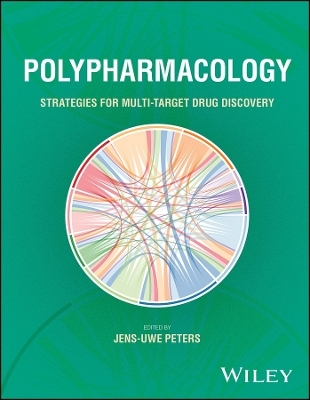
Polypharmacology
Strategies for Multi-Target Drug Discovery
Seiten
2025
John Wiley & Sons Inc (Verlag)
978-1-394-18283-1 (ISBN)
John Wiley & Sons Inc (Verlag)
978-1-394-18283-1 (ISBN)
- Noch nicht erschienen (ca. April 2025)
- Versandkostenfrei
- Auch auf Rechnung
- Artikel merken
Practical guide to navigate problems involved with promiscuous ligands and multi-target drug discovery, supported by case studies and real examples
Polypharmacology covers the two-sided nature of polypharmacology: its relevance for adverse drug effects, as well as its benefit for certain therapeutic drug classes in effectively treating complex diseases like psychosis and cancer. The book provides practical guidelines and advice to help readers design drugs that have multiple targets while minimizing unwanted off-target effects, discusses important disease areas like viral infection, diabetes, and obesity that have advanced significantly in the last decade, and guides researchers in neighboring areas to polypharmacology.
The book is divided into four parts. Part A covers the link between off-targets and adverse drug reactions, how to screen for off-target activity, and how to recognize and optimize compounds with a potential for off-target activity. Part B discusses disease areas which benefit from polypharmacological approaches. Part C highlights important approaches, such as compound design, data mining with web-based tools, and multi-target peptides. Part D provides case study coverage on topics like CDK4/6 inhibitors for cancer treatment, the potential of multi-target ligands for COVID, and protein degraders and PROTACs.
Sample topics discussed in Polypharmacology include:
Molecular properties and structural motifs in pharmacological promiscuity, covering lipophilicity, molecular weight, and other parameters
Kinase liabilities in early drug discovery, covering core kinases driving the cell division cycle and consequences of interference, and cell cycle checkpoints controlling cell division
Treatment of major depressive disorder, covering tricyclic antidepressants, monoamine oxidase inhibitors, and selective serotonin and norepinephrine reuptake inhibitors
Trends in the field, such as novel antipsychotics, standardization of screening tools, and the SmartCube System®, as well as lessons from history
Delivering the latest research developments in the field, Polypharmacology is an essential reference on the subject for medicinal chemists, pharmacologists, biochemists, computational chemists, and biologists, as well as pharmaceutical professionals involved in drug discovery programs.
Polypharmacology covers the two-sided nature of polypharmacology: its relevance for adverse drug effects, as well as its benefit for certain therapeutic drug classes in effectively treating complex diseases like psychosis and cancer. The book provides practical guidelines and advice to help readers design drugs that have multiple targets while minimizing unwanted off-target effects, discusses important disease areas like viral infection, diabetes, and obesity that have advanced significantly in the last decade, and guides researchers in neighboring areas to polypharmacology.
The book is divided into four parts. Part A covers the link between off-targets and adverse drug reactions, how to screen for off-target activity, and how to recognize and optimize compounds with a potential for off-target activity. Part B discusses disease areas which benefit from polypharmacological approaches. Part C highlights important approaches, such as compound design, data mining with web-based tools, and multi-target peptides. Part D provides case study coverage on topics like CDK4/6 inhibitors for cancer treatment, the potential of multi-target ligands for COVID, and protein degraders and PROTACs.
Sample topics discussed in Polypharmacology include:
Molecular properties and structural motifs in pharmacological promiscuity, covering lipophilicity, molecular weight, and other parameters
Kinase liabilities in early drug discovery, covering core kinases driving the cell division cycle and consequences of interference, and cell cycle checkpoints controlling cell division
Treatment of major depressive disorder, covering tricyclic antidepressants, monoamine oxidase inhibitors, and selective serotonin and norepinephrine reuptake inhibitors
Trends in the field, such as novel antipsychotics, standardization of screening tools, and the SmartCube System®, as well as lessons from history
Delivering the latest research developments in the field, Polypharmacology is an essential reference on the subject for medicinal chemists, pharmacologists, biochemists, computational chemists, and biologists, as well as pharmaceutical professionals involved in drug discovery programs.
Jens-Uwe Peters, PhD is a Senior Scientist at Idorsia Pharmaceuticals and previously worked at Roche. He has extensive experience with drug discovery projects and safety profiling. He edited the book Polypharmacology in Drug Discovery (Wiley 2012).
| Erscheint lt. Verlag | 27.4.2025 |
|---|---|
| Verlagsort | New York |
| Sprache | englisch |
| Themenwelt | Medizin / Pharmazie ► Medizinische Fachgebiete ► Pharmakologie / Pharmakotherapie |
| Naturwissenschaften ► Biologie ► Biochemie | |
| Naturwissenschaften ► Chemie ► Physikalische Chemie | |
| ISBN-10 | 1-394-18283-X / 139418283X |
| ISBN-13 | 978-1-394-18283-1 / 9781394182831 |
| Zustand | Neuware |
| Informationen gemäß Produktsicherheitsverordnung (GPSR) | |
| Haben Sie eine Frage zum Produkt? |
Mehr entdecken
aus dem Bereich
aus dem Bereich
Arzneimittelverzeichnis für Deutschland (einschließlich …
Buch | Hardcover (2024)
Rote Liste Service GmbH (Verlag)
CHF 149,95
Englisch für Apotheker und PTAs
Buch | Spiralbindung (2024)
Kohlhammer (Verlag)
CHF 44,75


